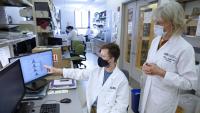Areas of Research

Explore the areas of research of the Columbia Center for Translational Immunology.
Organ Transplantation
Right now in the United States, there are more than 100,000 people waiting for an organ transplant. Each day, on average, 18 of these patients die before a suitable donor organ can become available. Even the lucky patients, who receive a needed organ, face a lifetime on immunosuppressant drugs, making them vulnerable to serious infections and other side effects. New solutions are urgently needed, not only to alleviate the critical shortage of organs and give more patients a second chance at life, but also to radically improve the quality of that life after transplantation.
The Columbia Center for Translational Immunology at Columbia University Irving Medical Center seeks to provide these solutions. Under the leadership of Megan Sykes, MD, a world-renowned expert in transplantation biology, the Center will strive to develop novel treatments for human disease, through the discovery and application of new knowledge about the immune system. Among the most vital areas of research, Dr. Sykes will bring her expertise in the pioneering technique of combining organ transplantation plus bone marrow transplantation to induce the immune system to tolerate transplanted organs and avoid the need for lifelong immunosuppressive drugs. This is a revolutionary advancement that has the potential radically transform life after transplantation.
As one of the largest organ transplant centers in the United States, which has just embarked on a new, institution-wide Transplant Initiative, CUIMC is in a leadership position to spread this innovative treatment protocol to other transplant centers, to extend and improve the lives of organ recipients all over the world.
Type 1 Diabetes and Other Autoimmune Diseases
The positive implications of advances in immunology extend far beyond the field of organ transplantation. With greater knowledge about how the body fends off disease, we can move toward developing treatments that work in harmony with the immune system’s processes, resulting in better outcomes for patients. With access to CUIMC’s world-class resources and collaborations, the CCTI has the potential to revolutionize how medicine views and treats a broad range of human diseases, from cancer to lupus to type 1 diabetes.
The immune system is a network of cells, tissues, and organs that work together to defend the body against harmful substances, such as bacteria, viruses, and toxins, which are called antigens. In patients with an autoimmune disorder, however, the immune system responds to its own healthy tissue as if it were an invader and mounts an immune response to attack it. The result is a reaction that destroys the body’s healthy tissue.
Type 1 diabetes (T1D) is the product of such an overactive immune response. The immune system attacks its own insulin-producing units in the pancreas, known as beta cells, and destroys the body’s ability to regulate blood sugar properly. With regular injections of insulin to control glucose in the blood, and lifestyle modification, T1D can be managed. If poorly managed, however, T1D results in a host of serious complications, including blindness, kidney failure, nerve damage, amputation of limbs, and heart disease; if left entirely uncontrolled, T1D is fatal.
The CCTI seeks to develop novel treatments for autoimmune diseases, including a focus on type 1 diabetes. In collaboration with the Naomi Berrie Diabetes Center, the CCTI has the potential to revolutionize how medicine views and treats not only TID, but a broad range of autoimmune diseases. With greater knowledge about the processes that go awry in T1D, we can move toward developing treatments that work in diseases such as rheumatoid arthritis and lupus in addition to T1D. This will lead to better quality of life for those patients struggling every day with serious autoimmune diseases and, often, pain.
With a deeper understanding of the mechanisms of immune cell function, born from this basic research, we will be able to take advantage of scientific opportunities to manipulate immune function–either reducing or augmenting it, as needed.
Strategies to Improve Cancer Treatment
CCTI investigators have focused on developing improved ways of using bone marrow (or hematopoietic stem cell transplantation) to improve cancer therapy while reducing the complications of this type of transplant. In collaboration with the new bone marrow transplant program being established at Columbia, Dr. Sykes and colleagues will continue to translate novel approaches to this type of immunotherapy from the laboratory into clinical trials.
These studies will also involve collaboration with the Herbert Irving Comprehensive Cancer Center (HICCC). Immunology research into the development and potential treatment of a variety of cancers is a major activity of the HICCC, and collaboration with the CCTI will be of great benefit in their overlapping efforts.